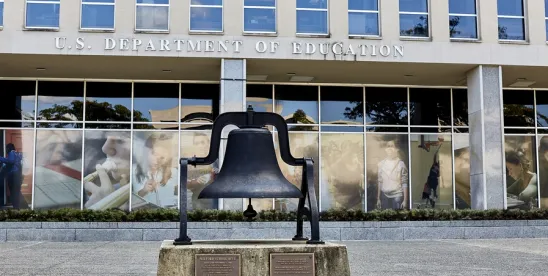A recent executive order signed by President Trump focuses on shrinking the Department of Education to prepare it for a possible future closure
Actual closure requires an act of Congress
The executive order directs the department to focus on DEI initiatives while open
President Donald Trump recently signed an executive order directing the secretary of the Department of Education to begin “tak[ing] all necessary steps to facilitate the closure of the Department of Education and return authority over education to the States and local communities while ensuring the effective and uninterrupted delivery of services, programs, and benefits on which Americans rely.”
In preparation for its closure, the Department of Education recently reduced its workforce by nearly 2,000 employees and began determining which federal departments will be responsible for the regulation and enforcement of various federal education laws in the event of the department’s closure.
Department of Education and an Act of Congress
As acknowledged by the administration, while President Trump can reduce the workforce and capacity of the Department of Education, actually closing the department requires Congress’ approval. On March 20, President Trump made it clear that a major purpose of the executive order directing the dismantling of the Department of Education is to prepare for its closure in the event Congress approves.
Uncertain Regulatory Landscape
In the event Congress does approve the Department of Education’s closure, there are still several education-related federal laws and programs requiring regulation and enforcement. While attempting to close the Department of Education, the administration has reportedly begun contemplating which entities will take on regulation and enforcement of these laws, noting special education law regulation and enforcement would likely be handled by the Department of Health and Human Services while the Small Business Administration would administer the federal student loan program. Notably, the administration has not addressed which agency would take over Title IX investigations.
Regulation and enforcement of education-related laws and programs by other agencies could be slow to come, as regulators learn these laws and programs and entities covered by these laws learn to work with new regulators. There will also likely be questions raised regarding whether these agencies possess the delegated authority required to enforce and regulate compliance with these laws.
Focus of the Department of Education Until Closure
While the Department of Education remains open, the executive order directs the secretary to “ensure that the allocation of any Federal Department of Education funds is subject to rigorous compliance with Federal law and Administration policy, including the requirement that any program or activity receiving Federal assistance terminate illegal discrimination obscured under the label ‘diversity, equity, and inclusion’ or similar terms and programs promoting gender ideology,” likely referring to recently issued executive orders on DEI and gender and the requirements of the Department of Education’s recent Dear Colleague Letter and corresponding FAQs. The Department of Education has already begun complying with this directive, investigating universities for alleged race-based admissions processes and scholarships and school districts for allegedly permitting transgender girls to use female changing rooms.
Takeaways
While the executive order did not close the department, the department continues to decrease in size and capacity. The executive order suggests DEI initiatives will be a focus of the department going forward. The administration is reportedly determining distribution of the department’s duties among other federal agencies in the event department closure occurs.






 />i
/>i

